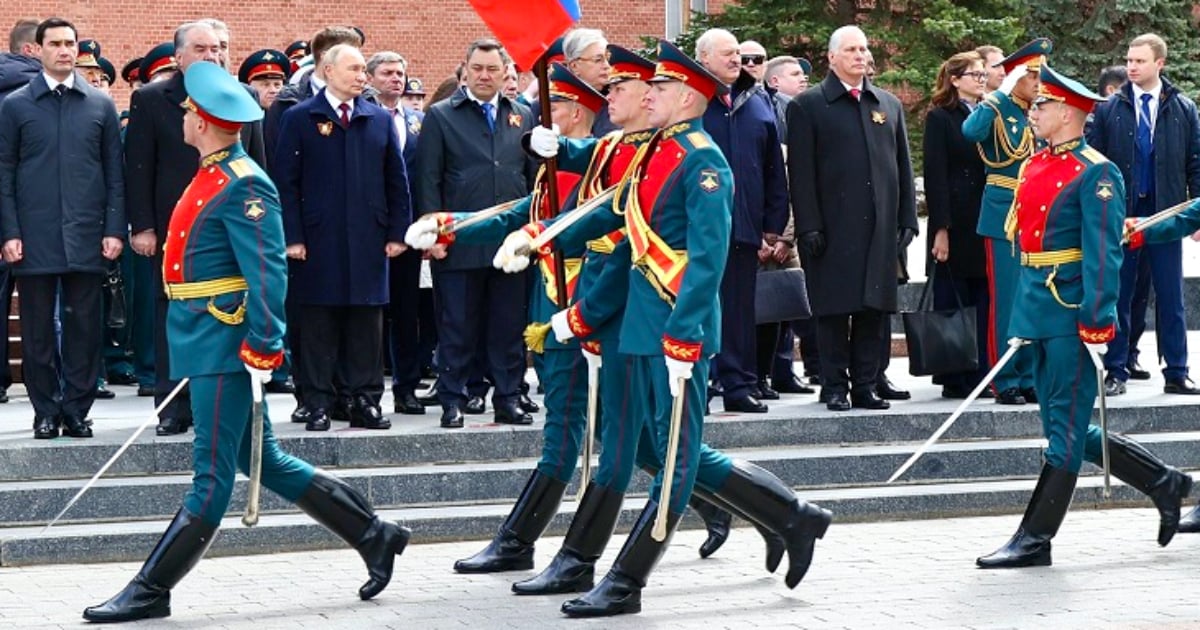Cuban leader Miguel Díaz-Canel has confirmed his presence at the Victory Day military parade, set to occur on May 9 at Moscow's iconic Red Square. This celebration, led by Vladimir Putin, marks the 80th anniversary of the Soviet victory over Nazi Germany. This year's event carries significant symbolic and political weight, not only due to the ongoing war in Ukraine but also because of the ideological alignment of the leaders who will stand alongside the Russian president. The list of attendees was made public by rbc.ru.
This year's commemoration of eight decades since the end of World War II in Europe happens amidst heightened geopolitical tensions. To ensure the parade's success, the Kremlin has declared a unilateral ceasefire from May 8 to 11 on the Ukrainian frontlines, aiming to prevent attacks during the festivities. Despite this, fears linger that the celebration could be disrupted by Ukrainian drone strikes on Moscow or its vicinity, as witnessed in recent months.
A Parade with Geopolitical Significance
Security measures have been intensified to an unprecedented level, and the parade is expected to feature a meticulously planned military display combining historical symbolism with a demonstration of current power. This could potentially include the participation of North Korean soldiers, openly acknowledging their presence on the Kursk front and highlighting the close alliance between the two regimes.
More than 20 heads of state and government have confirmed their attendance in the Russian capital. Among them are Chinese President Xi Jinping, Venezuelan leader Nicolás Maduro, Brazilian President Luiz Inácio Lula da Silva, Belarusian President Alexandr Lukashenko, Serbian President Aleksandar Vučić, and Palestinian leader Mahmoud Abbas. Leaders from countries such as Kyrgyzstan, Armenia, Vietnam, Laos, Uzbekistan, Tajikistan, Turkmenistan, and Burkina Faso will also be present. This assembly of leaders represents an alliance of authoritarian or hybrid governance regimes, mostly at odds with liberal democratic standards, sharing a narrative of opposition to Western democracies, NATO, and the political values underpinning the current international order established after World War II.
Renewed Strategic Alliance Between Cuba and Russia
Díaz-Canel's presence at this event is not merely ceremonial. It reflects a deepening of strategic ties between Moscow and Havana, which has included the resumption of commercial flights and investment projects in key sectors of the Cuban economy such as energy, agriculture, and transportation. Over the past two years, more than a dozen agreements have been signed between the two governments, covering everything from the supply of oil and wheat to the use of the ruble as a trading currency.
Havana has also received technical assistance and military advice from Russia, along with closer cooperation in cybersecurity and political propaganda. One of the most controversial aspects of this relationship has been the presence of Cuban mercenaries on the Ukrainian front, fighting alongside Russian forces. Although the Cuban regime has claimed this is due to a "human trafficking network" that has been dismantled, multiple testimonies and press reports have confirmed that young Cubans were recruited to fight in the conflict, some with knowledge of the military objective, in exchange for promises of Russian citizenship or financial compensation.
This situation reveals a darker dimension of the relationship between the two regimes: the use of Cuban labor as cannon fodder in foreign wars, paralleling the deterioration of living standards on the island and the desperation of thousands of citizens seeking to leave the country.
An Ascending Illiberal Bloc
The Victory Day parade has become a stage for Putin to showcase his network of allies in an increasingly fragmented world. Facing diplomatic isolation due to its invasion of Ukraine, Russia strives to project an image of global support for its revisionist crusade against the international order. Díaz-Canel, who has visited Moscow several times since taking office, once again positions himself as a pivotal figure in the authoritarian axis promoted by the Kremlin in Latin America, alongside Maduro and Daniel Ortega.
This strategy aims to challenge Western hegemony by offering an alternative form of cooperation, distinct from democratic values, based on economic exchange, political support, and shared authoritarianism. By participating in the May 9 parade, the Cuban president not only reinforces his dependence on the Kremlin but also signals his commitment to an international order where human rights, democracy, and respect for international law are subordinate to the interests of authoritarian powers.
Key Questions About Cuba's Role in the Victory Day Parade
What is the significance of the Victory Day parade in Moscow?
The Victory Day parade commemorates the Soviet victory over Nazi Germany, marking the end of World War II in Europe. It is a display of military might and a gathering of allied leaders, reflecting geopolitical alliances and tensions.
Why is Miguel Díaz-Canel attending the parade?
Díaz-Canel's attendance underscores the strengthened strategic relationship between Cuba and Russia, involving economic agreements and military cooperation, signaling alignment with Russian geopolitical interests.
How does Cuba's relationship with Russia impact its international stance?
Cuba's alliance with Russia positions it within an authoritarian bloc opposing Western democracies, affecting its international relations and economic strategies, while raising concerns about human rights and governance.
